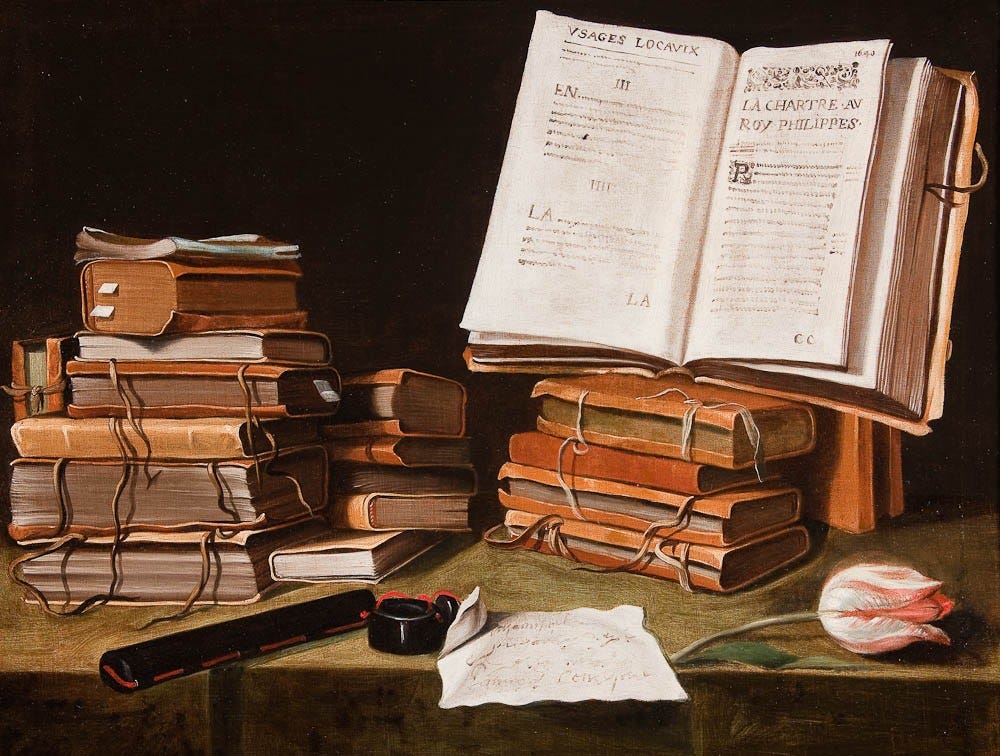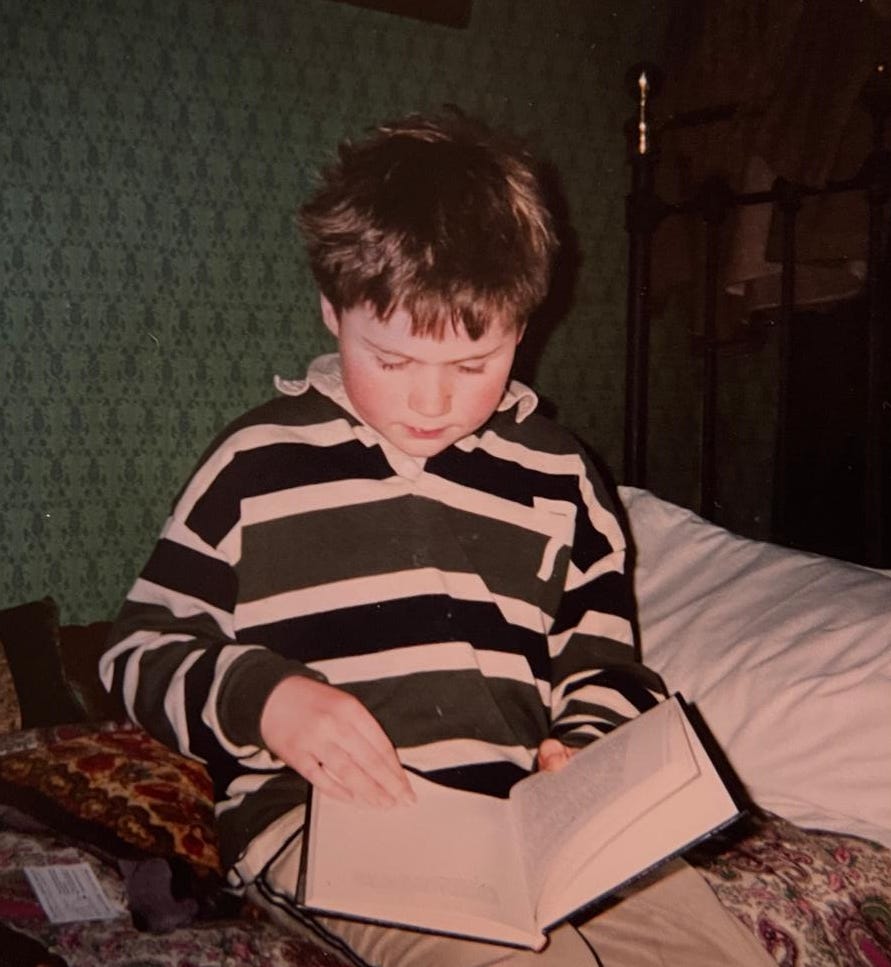How to read and why
I love reading and I love advice about how to read. I’m especially fond of these columns about how to read by Rob Henderson from his Substack and Janan Ganesh in the Financial Times.
Both writers say they are often asked how much they read, how they read and what they read. I often get the same questions (especially by readers of this Substack) so here is my attempt at an answer.
I generally get through one or two books a week in my leisure time. Plus I’m constantly skimming bits of others in the library for work.
I usually read two books simultaneously: one physical copy and another on my Kindle. The Kindle is useful because I can use it to read myself to sleep. I find it a good way to get through more heavy going books. By reading in bed with the lights out you are free of daytime distractions and turn yourself into a captive audience. If the book is boring it will help send you to sleep but even if you only read a few pages a night, you will eventually find that you have got through a long difficult book. Often it happens faster than you think.
One of the best things I did as a reader was to get rid of my iPhone. I swapped my smartphone for a semi-dumb phone, the Qin F21 pro which has WhatsApp and Google Maps but nothing else. This will sound drastic to some but it’s much easier to live without a smartphone than people assume and definitely worth at least trying (dumb phones are cheap and you can always keep your iPhone in a drawer for emergencies).
Before I ditched my smartphone I went through phases of trying to improve my concentration by putting it in another room while I read, or deleting all my social media apps but those strategies never worked. Smartphones are designed by some of the greatest geniuses alive to steal our attention. Most people aren’t strong enough to stop them doing that.
I have found that not only do I read more without my smartphone but I also get much more immersed in books in a way I remember from childhood. It’s extremely pleasant. Another unexpected benefit is that it has made me much likelier to read on public transport. It’s amazing how much more you get through if you spend every half hour bus ride with a book, rather than scrolling on your phone.
But if want to be sure you are going to really get through a book rather than drifting along half-reading and not really absorbing the same one for months on end you have to sit down to read properly every day.
Janan Ganesh is a bit strict about this but he makes a good point:
Don’t read fewer than 50 pages in a sitting. The cost of pecking at a book here and there is a lost sense of its narrative wholeness. (“If you read a novel in more than two weeks, you don’t read the novel” — Philip Roth.)
This is obviously hard to do (and I don’t think you have to read at least 50 pages every time you sit down to read) but I liked Rob Henderson’s motivational drill sergeant attitude:
Reading takes time. You have to make it a non-negotiable part of the day.
This precious time must be guarded! Some thinkers, as they rise in prominence as a result of their interesting ideas, gradually devote less time to reading and more time to lucrative opportunities. This is a mistake. They are neglecting one of the core habits that made them so interesting in the first place.
Similar to a gym routine, it must be built right into your schedule and must become an unthinking custom.
Unless you’re studying something or researching a topic I strongly believe it’s important to read what you actually want to read. Dr Johnson was right:
[Johnson] said that for general improvement, a man should read whatever his immediate inclination prompts him to … He added, ‘what we read with inclination makes a much stronger impression. If we read without inclination, half the mind is employed in fixing the attention; so there is but one half to be employed on what we read … He said, ‘if a man begins to read in the middle of a book and feels an inclination to go on, let him not quit it to go to the beginning. He may, perhaps, not feel again the inclination’.
You can waste a lot of time trudging dutifully through a book you feel you should read. By the time you get to the end you are unlikely to remember much. In the same time you could have read several books that really compelled you and retained a lot more from them.
I don’t feel much guilt about not finishing books. Though I do have a loose equation in my mind. The better a book’s reputation, the harder I will try with it. A recent non-fiction book that is dull or thinly-written I will put aside without compunction. But if I’m reading, say, The Brothers Karamazov (a book I finished recently and found hard-going for long stretches) I tend to assume the problem is me not Dostoevsky and try to keep going. A level of humility is a good attribute in a reader.
I don’t generally take notes when I read (unless I’m doing research). I tend to think it’s best to let your brain do the filtering: if something’s really important it will stick. But this may be my job. As a columnist, if a thought is not memorable enough to last without writing it down it’s probably not worth putting in a column.
Some of the best advice I have had is that if you really want to get your head around a topic, read two different books about it simultaneously.
As Janan Ganesh says in his piece, the best book about China is almost never called “A History of China”. He advises readers instead to seek “the universal in the particular”. Small details and anecdotes can be more illuminating about a subject than dry summaries of events. It’s an unusual kind of person who is able to retain much that is useful from a vast 700-page summary of every war, famine and economic downturn in the nineteenth century.
I also think really interesting writers are less likely to spend time churning out comprehensive chronological summaries of historical epochs (though there are exceptions — the best book on the eighteenth century really might be Tim Blanning’s The Pursuit of Glory: Europe 1648-1815).
Often a field has one brilliant popularising specialist who can completely open it up to you. Find that person. I had always been theoretically interested in the period of late antiquity but never found a good way into the subject. Last year I discovered the work of Peter Brown who is a stunningly lucid and intelligent writer. His books The World of Late Antiquity and The Rise of Western Christendom are some of the best experiences of reading about history that I’ve ever had.
When you do find an author as good as that, it can be worth following their other books on different topics to see what else they can get you interested in. I will read any book by the historian Keith Thomas or the biographer Claire Tomalin.
Very often the best non-fiction book on the topic is not the most recent one. Most general readers don’t need the up-to-date revisionist account of a topic (which is often the one Google recommends). Go for the best-written book every time.
I have a vague unprovable theory that there is a sweet spot of popular non-fiction books published between about 1960 and 2005 (roughly between Richard Ellman’s biography of Joyce and Leo Damrosch’s book about Rousseau, which is one of my favourite popular biographies). It’s not an inevitable rule, but many non-fiction books before 1960 now seem amateurish, waffly and dated. Many books published after the early 2000s are by authors who grew up in a less literature-saturated environment or were over-exposed to academic jargon, or were constantly checking their phones while they wrote.
Don’t neglect novels. A lot of “how to read” columns have a utilitarian bias: reading is for acquiring information and ideas about the world. But even if you are going to be purely utilitarian about reading and aren’t at all interested in having a profound experience of art (or whatever), novels provide a crucial kind of information you can’t get anywhere else. As John Carey puts it in his book What Good Are the Arts? great works of literature “do not tell you what the truth is, they make you feel what it would be like to know it”.
When I first read Elena Ferrante’s Neapolitan Quartet, I knew that I had learnt something important about what it is like to be a teenage girl — the awkwardness, the embarrassment, the sudden disorienting sexual attention of men. Obviously, I had been told about those things before. But Ferrante, to employ Carey’s useful phrase, made me feel what it was like to know it. Emotional understanding is a kind of knowledge humans can assimilate and machines cannot. It should not be underrated.
I’m not snobbish about audiobooks. I usually have one on the go. But I accept I am not likely to retain much information from them, if any. The most I can hope for is a vague outline of a subject. I listened to most of Ritchie Robertson’s book The Enlightenment as an audiobook. I really enjoyed it but a couple of months later I couldn’t tell you a single new fact about the Enlightenment.
Podcasts can be useful to reinforce knowledge. I read Iain McGilchrist’s The Master and His Emissary last year which is fascinating but a bit rambling and unstructured. I found it easier to get a handle on its main arguments and themes by listening to McGilchrist speak about it on various podcasts in between reading the book.
But generally podcasts and summarising apps are useless as shortcuts to information. Books remain the best technology ever invented to understand life and the world. There is no alternative.
The New York Times columnist Ezra Klein put it nicely on his recent appearance on the podcast How I Write:
I thought that what you were doing [with reading] was downloading information into your brain, and now I think that what you were doing is spending time grappling with the text, making connections. It will only happen through that process of grappling. And so the idea that you could speedrun that, the idea that could just be summarised for you [is wrong]. Part of what is happening when you spend 7 hours reading the book is you spend 7 hours with your mind on [this one] topic.
The more podcasts I listen to, the more I appreciate how dense books are in information. Nothing else comes close. A podcast or an article or an AI summary can give you an outline. But even a short book (if it’s good) is full of extraneous information that enriches your understanding of the world in various unguessable and invaluable ways.
For instance, from Maurice Cranston’s biography of Rousseau which I have just finished reading, I learned about Rousseau (obviously), but also about the history of political theory, the manners of the French aristocracy, the political constitution of Geneva, the birth of the Encyclopedia, the career of the philosopher Diderot, the history of English attitudes to free speech and about human nature in general1. All kinds of gaps have been filled in. And new questions have been prompted. Every book you read helps you build a richer picture of the entire world.
There’s a bit in the book in which a young writer writes to Rousseau telling him how much he loves his novel. A few weeks later, Rousseau is asked to provide a reference for him. Naturally he does so enthusiastically and the guy gets the job. A useful reminder that human nature sometimes really is that simple.





Lovely article. I’d also recommend the joys of re-reading. It feels like a guilty pleasure - so many worthy books sitting there unread! - but it can be one of life’s greatest joys, a rekindled friendship mixing the familiar with a new perspective.
"But if I’m reading, say, The Brothers Karamazov (a book I finished recently and found hard-going for long stretches) I tend to assume the problem is me not Dostoevsky and try to keep going. A level of humility is a good attribute in a reader." The problem might have been the translation. There's a lot of bad ones out there. If you read a different one, I'd recommend Richard Pevear and Larissa Volokhonsky's translation. Like reading a different book.
And on the topic of late antiquity, Tom Holland's In the Shadow of the Sword is terrific. I'd also suggest Grave's novel Count Belisarius which traces the rise and fall of the Byzantine Empire’s greatest general